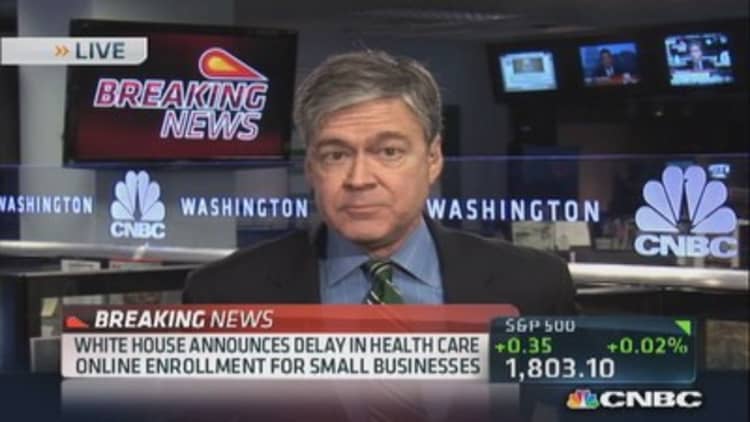Seven states and cities currently have paid sick leave laws: Connecticut; San Francisco; Washington, D.C.; Seattle; Jersey City, N.J.; New York City; and Portland, Ore. Measures in the last three were passed this year.
Grassroots efforts in states including Arizona, Minnesota, Illinois and North Carolina have grassroots efforts seeks to put paid sick leave laws in their legislatures in 2014.
But 10 states have passed paid sick leave bans in the past three years, seven of them in 2013, according to research by the Economic Policy Institute (EPI), a think tank that focuses on issues concerning low- and middle-income workers.
Similar bans are under consideration in 14 other states, along with efforts to weaken or eliminate current laws that mandate paid sick days for private businesses.
"Absent workers impose real costs on firms," said Marjorie Baldwin, a business professor at Arizona State University's W.P. Carey School of Business. "With hiring replacement workers and lost productivity, it's natural the firms would not want to 'pay for' absenteeism."
Others, however, point out that paying people to stay home when they are ill prevents them from infecting other workers.
"This is penny-wise and pound-foolish," said Lynne Sarikas, director of the MBA Career Center at Northeastern University. "If you take away sick leave, you get people coming to work sick who then get other people sick."
"What you save on not paying the first person to stay home you lose many times over with other people getting sick and not being productive," she said.
(Read more: Nine Senate Dems push for Obamacare work-around)
Fear of losing job from illness
Some 40 million Americans don't have even one paid sick day, according to the EPI. Most of them are in low-wage jobs such as food service and child care.
Because the U.S. is the only major industrial country without national paid sick leave laws, it's up to states, cities—and employers themselves—to determine whether private-sector workers have compensated sick days.
Government workers at the state, local and federal levels have paid sick leave policies, and the U.S. guarantees unpaid leave for serious illnesses through the Family and Medical Leave Act.
A 2010 study from National Opinion Research Center at the University of Chicago showed that 55 percent of those without paid sick days went to work with a contagious illness such as the flu, versus 37 percent of those with paid sick days.
(Read more: Calif. health exchange chief: 'We're seeing results')
Twenty percent of those without sick day coverage used hospital emergency rooms because they "were unable to take off from work to get medical care during normal job hours," versus 10 percent of workers with paid sick days, the study said.
A recent study from EPI determined that paid sick days for all workers could prevent 1.3 million emergency room visits in the U.S. annually, saving $1.1 billion in medical costs.
Those taking time off without a sick leave policy also run the risk of being put out of a job, according to the University of Chicago study, which found that nearly one in six people surveyed lost their employment for taking time off to deal with a personal or family illness.
'Moral hazard issue'
According to EPI, efforts to prevent or eliminate sick leave laws are being spearheaded by some business groups and conservative politicians, including members of the American Legislative Exchange Council, or ALEC.
ALEC describes itself as an organization that "works to advance the fundamental principles of free-market enterprise, limited government and federalism at the state level through a nonpartisan public-private partnership of America's state legislators, members of the private sector and the general public."
In an emailed response to CNBC.com, ALEC said, "There is a significant amount of coverage that indicates we have taken positions on the issue [paid sick leave], but no position has ever been taken by the organization."
Businesses are concerned about creating absenteeism that wouldn't occur otherwise, said Baldwin at ASU.
"Paid sick leave creates a 'moral hazard' problem for businesses and changes people's behavior," she said. "Paid sick leave is likely to increase the number of sick days employees take. If the paychecks keep coming, why return to work?"
But not all businesses oppose paid sick leave laws. When San Francisco passed the nation's first such law in 2006, some employers expressed concern about its impact on their bottom line. But a 2011 survey showed that two-thirds of employers in the city support the law, according to the Institute for Women's Policy Research.
Majority support paid sick leave

A poll this past summer showed that 74 percent of U.S. workers surveyed believe that employers should be required to offer paid sick leave,
Some businesses agree, using paid sick leave as part of their overall compensation package. The percentage of workers getting such leave has risen over the last two decades, according to the Bureau of Labor Statistics. Sixty-one percent of private-sector employees had paid sick days last year, compared with 50 percent in 1992.
The number of paid sick days has fallen, however, from an average of 10 days after a year on the job in 1992 to eight days in 2012.
The amount could get to zero if some states and cities have their way.
(Read more: Supreme Court takes up religious objections to Obamacare)
"Perhaps we are seeing the rash of preemptive legislation prohibiting municipalities from giving paid sick leave because of the budget crises in cities such as Detroit," said Baldwin. "And states like North Carolina offer favorable conditions to attract industry because labor costs are lower than in more heavily unionized states."
She advocates a compromise, such as paying sick days at a reduced rate so that "the worker bears part of the costs."
But there's a simple fix, according to Sarikas at Northeastern University.
"It's a much better investment to pay the sick employee to stay home," she said, "instead of infecting the entire office and really losing productivity."
—By CNBC's Mark Koba. Follow him on Twitter @MarkKobaCNBC.


